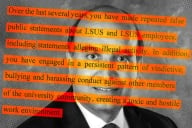You have /5 articles left.
Sign up for a free account or log in.
Welcome to the Weekly Higher Ed Innovation Roundup.
- Lifelong learning should focus on educating the whole self, not just the worker self.
My must-read from last week was Packing for the journey: Can lifelong learning fit in a college-sized suitcase? by Richard Price. Lifelong learning is not just about the economy; it is about our society as a whole. It should ask us to think about who we are and inspire us to think about who we want to be. A repetitive focus on job preparation, the future of work, and the economy as separate from life preparation, the future of society, and life as a whole creates a false dichotomy. Lifelong learning has to be about life, not just work. Gallup and Strada also released From College to Life: Relevance and the Value of Higher Ed last week, a report that was focused on the connection of college to jobs. A rewarding career is just one part of a good life. A 35-hour work week makes up approximately 20% of our daily lives. We should be asking ourselves what relevance education has to the other 80%? I would urge colleges (and Gallup polls) to focus on the whole self, not just the worker self. Our society, our democracy, needs us to focus on more than our careers.
- Should cities run public universities?
How much of a role should cities play in running public universities? That’s the question Boston Globe columnist Shirley Leung asked last week in Should Boston run UMass Boston? Walsh thinks it’s an idea worth discussing. Leung covers NYC and San Francisco in her post as “two cities that have formed deep partnerships with public higher education.” As she points out, now more than ever, Boston needs a go-to university to provide the well-educated community needed to move us forward. If UMass Boston is unable or unwilling to play that role, I would venture that there are many private institutions that are more than willing to step into that space.
- Chief Diversity Officer as path to the college presidency?
Some of the most challenging issues we are facing on campus today are in the areas of diversity and inclusion. These cut across the entire institution and, necessarily, Chief Diversity Officers (CDOs) are often direct reports to the president, increasingly at the Vice Presidency level. Inside Higher Ed has a nice piece on this: From Diversity Chief to College President. Our responsibility in higher ed is to acknowledge the increasing importance of this role and to work collaboratively with our CDOs with the awareness that they just might be our next president. From Academic Affairs, this means making sure CDOs have opportunities to work collaboratively with faculty and to understand the value of faculty, shared governance, and tenure. Do you have a CDO? Do you work with them? What does that work look like?
What did I miss? What should I cover next week? Let me know in the comments below or on Twitter @mary_churchill.
Mary Churchill is the Vice President for Academic Affairs at Wheelock College in Boston. She is also on the board of the Massachusetts A.C.E. Network of Women Leaders in Higher Education and involved with A.C.E.'s Moving the Needle initiative focused on advancing women leaders in higher education.








